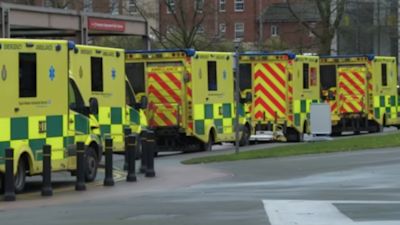Bed-blocking in hospitals is 'huge challenge' for ambulance service in Gloucestershire

Ambulance bosses in Gloucestershire have called for more hospital beds and care home places to help improve issues with waiting times as they say 1,000 hours of work time was wasted waiting to hand over patients last week.
South Western Ambulance Service has been under fire for its response times in recent months but the Chief Executive Will Warrender told councillors in Gloucester that the handover delays remain the service's biggest obstacle.
This problem is commonly referred to as bed-blocking, meaning patients in hospital are ready to be discharged or transferred to other care facilities but the support they require is not readily available.
The service has said that it is under intense and sustained pressure across the South West and statistics have revealed that patients are experiencing an average handover wait of more than an hour.
This process should usually take 15 minutes.
Some 10,000 hours were lost last week to handover delays across the South West. This is up from 360 hours during one week in 2020 and around 10% of the hours lost last week were attributed to Gloucestershire.
“Our service remains under intense sustained pressure and performance, I’m afraid, it has not returned to pre-pandemic levels," Mr Warrender said.
"That, of course, means very sadly that some of our patients are experiencing long waits for an ambulance.
“We are extremely concerned about the impact to our patients and we are absolutely resolute in our focus to address that.
“Handover delays remain our single biggest challenge at this time. A hospital emergency department should accept the transfer of a patient into their care from the ambulance service within the national standard time of 15 minute.
“If not, then a handover delay occurs and the patient remains with the ambulance service until the hospital accepts the handover of care.”
He gave a few figures to illustrate the scale of the problem and explained what the ambulance service is doing to alleviate the problem.
“We continue to work very closely with hospitals across the region and of course Gloucester and Cheltenham are no different to ensure our crews can get back out on the road to respond to other 999 calls.
“Handover delays reflect blockages in the system and in the flow of patients through the health and social care system.
“The bottom line is that whilst all providers are striving to do more to manage their services better, there simply needs to be greater availability of beds in hospitals, in care homes and of course more support in the patient’s own home.”
Story credit: Local Democracy Reporting Service/Carmelo Garcia.